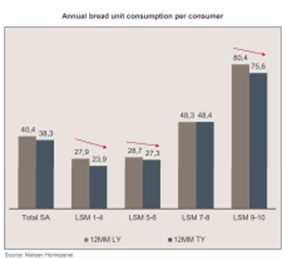- According to the makers of Albany bread, South Africans are eating less bread.
- This comes as commodities such as wheat face supply disruptions from the Russian war.
- Most consumers on both the upper and lower end of the income scale are eating less bread.
- The company said its brown bread bled some market share.
- For more stories go to www.BusinessInsider.co.za.
South African consumers across all income groups are eating less bread as prices for soft commodities, including wheat, continue to skyrocket, the maker of Albany bread has said.

Food producers in South Africa, and across the globe, are battling the inflationary pressures brought on by Russia’s invasion of Ukraine. The war has sent prices for essential commodities soaring.
On Wednesday, Tiger Brands reported its six-monthly financial results to the end of March, which reflected a 2% decrease to R7.4 billion in revenue for its grains division, driven mainly by volume losses in its wheat milling and bakery operations.
“The bread category in totality, what we did see over the last three years is muted growth with a deceleration of at least 5% in the last fiscal [year], across multiple LSM levels,” Yokesh Maharaj, chief growth officer for Tiger Brands said at the presentation of the results.

Consumers in the highest LSM group are abandoning bread the most, followed by consumers on the lower end of the income scale. Bread consumption among the mid-income group, although also declining, is seeing minute decreases.
Tiger Brands increased prices for some of its products in its previous financial year as cost pressures weighed on the business. The move, coupled with rising commodity prices, has led to consumers ditching bread, the company said.
“Overall, the adverse dynamics within the overall category do persist; our market pricing strategy, or the total market strategies, are not reflective of the environment that we’ve seen in relation to the soft commodities push that has occurred,” Maharaj said.
While the company saw some market gains for its white bread within the Albany brand, it saw accelerated market share declines in its brown bread.
While the company will work on securing and broadening supply, price increases are inevitable and will be significant, its chief financial officer, Deepa Sita, said.
She said it’s likely that inflation will run into the double digits during the second half of its financial year.
“Like most companies, Tiger Brands is also impacted by the global supply squeeze. We’ve experienced challenges in managing availability, timeous supply, as well as the significant cost increases coming through,” she said.
“We continue to see the pressure come through around the global supply and logistics constraints, as most organisations are feeling in South Africa. This has impacted both the cost as well as [the] availability of both raw material and packaging,” Sita said.
Tiger Brand, which also owns the Jungle Oats and Tastic brands, saw revenue for the reporting period increase only 2% to R16.8 billion, on the back of price inflation of 3%.







